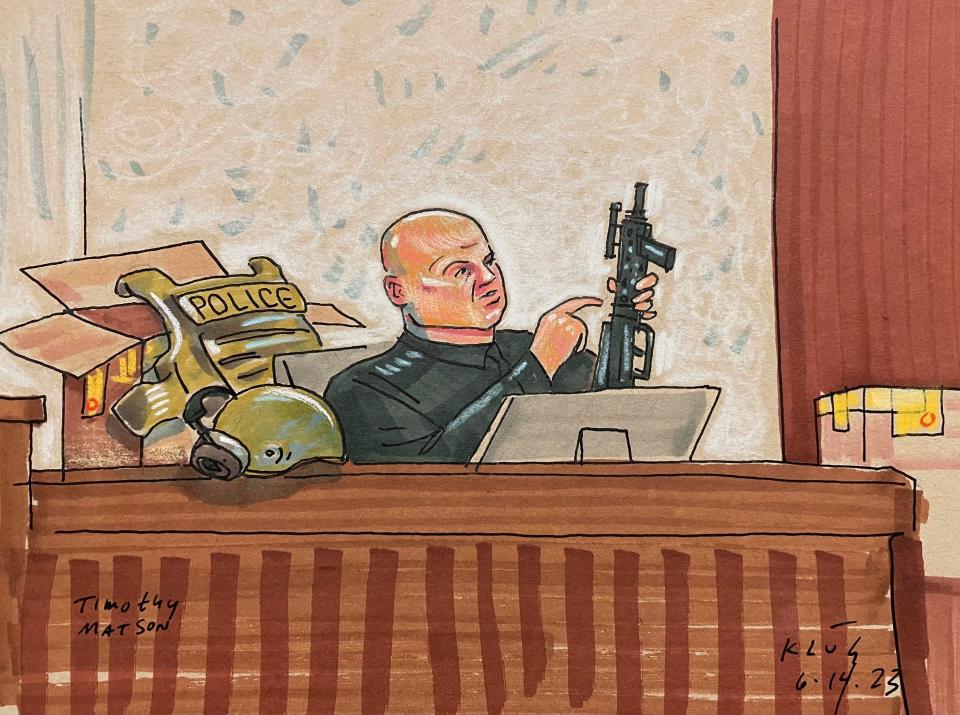Gunman guilty in shooting deaths of 11 worshippers at Pittsburgh Tree of Life synagogue
The man accused of committing the deadliest antisemitic attack in American history has been found guilty in the shooting deaths of 11 worshippers at the Pittsburgh Tree of Life synagogue in 2018.
Jurors returned a guilty verdict Friday after several hours of deliberating the case. They must next decide whether Robert Bowers' fate will be death row or life in prison, in what is expected to be a lengthy penalty phase of the trial.
Bowers was charged with 63 criminal counts, including 11 counts each of obstruction of free exercise of religion resulting in death and hate crimes resulting in death. He was found guilty on all 63 counts. Some of the charges carry a potential death sentence.
Bowers, a 50-year-old truck driver from the Pittsburgh suburb of Baldwin, hated Jewish people, and turned a house of worship into a "hunting ground" on Oct. 27, 2018, when he fired about 100 rounds and took 11 lives, including many elderly people, federal prosecutors said during the trial.
Deadliest antisemitic attack in US history
Bowers was accused of driving to the Tree of Life synagogue in Pittsburgh's Squirrel Hill neighborhood that morning and entering with multiple firearms, including an AR-15.
Several local congregations had gathered there to mark the Sabbath that day.
Police said Robert Bowers burst into the Tree of Life synagogue shouting "All Jews must die" as he opened fire on the congregants, killing 11 and injuring seven others, including five police officers who exchanged gunfire with him. Bowers was also hit by three bullets.
Prosecutors said during the trial he reloaded at least twice, stepped over the bloodied bodies of his victims to look for more people to shoot, and surrendered only when he ran out of ammunition.
Holocaust survivors were among the dead and wounded, officials said.
Authorities said Bowers told police after his arrest that he “wanted all Jews to die” and believed they “were committing genocide to his people."

'Hatred for Jews': Prosecutors detail history of antisemitism
Over 11 days of testimony, prosecutors presented evidence of what they said was Bowers' long-held hatred of Jewish people and immigrants. Bowers posted and shared antisemitic and white supremacist content on his social media, prosecutors said. He'd also praised Hitler and the Holocaust.
“The depths of the defendant’s malice and hate can only be proven in the broken bodies” of the victims and “his hateful words,” Soo C. Song, assistant U.S. attorney for the Western District of Pennsylvania, said in her opening statements.
REMEMBERING THE VICTIMS: A 97-year-old, an elderly wife and husband. These are the 11 victims of the Pittsburgh synagogue massacre
Jurors heard audio of a 911 call made by one of the victims during the attack. Prosecutors said one couple, Bernice and Sylvan Simon, “died in the pew they sat at week after week, year after year.”
Prosecutor Mary Hahn asked jurors to “hold this defendant accountable ... and hold him accountable for those who cannot testify.”
“He is filled with hatred for Jews,” Hahn said.
'WE'RE BEING ATTACKED': Jurors hear 911 call in Pittsburgh synagogue assault as trial begins
Defense didn't call witnesses
Bowers' defense team was largely focused on avoiding the death penalty rather than absolving him of guilt during the trial. The defense did not call any witnesses or present any evidence.
Bowers’ attorney, Elisa Long, told the jury during her closing argument Thursday that Bowers was not trying to stop people from worshipping – an element of some of the crimes he is charged with – when he attacked the synagogue. Rather, she said that Bowers had the “nonsensical and irrational” belief that he had to attack Jews because of their support for efforts to help immigrants and refugees, people he viewed as invaders.
Her argument brought a sharp retort from prosecutors. “These aren’t people engaging in refugee assistance. These are people who are practicing their faith,” U.S. Attorney Eric Olshan said.
In 2019, Bowers offered to enter a guilty plea in return for a life sentence but was denied.
Contributing: Marc Ramirez, USA TODAY; The Associated Press
This article originally appeared on USA TODAY: Pittsburgh synagogue massacre shooter found guilty on 63 counts

